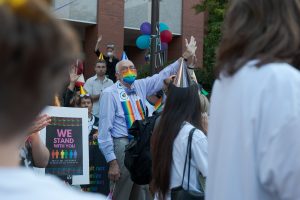She was notorious
How we can grow from Ruth Bader Ginsburg’s mistakes
October 8, 2020

Throughout her career, Ruth Bader Ginsburg fought for the rights of women, and even the rights of men, so that everyone could have the same status in our society. She fought for men to be given the same caregiving and social security benefits as their female counterparts, and for women to have the ability to be financially independent of their fathers and husbands. Her work paved the way for countless individuals to pursue the American dream.
Ginsburg was appointed to the Supreme Court in 1993 and served the American people until she passed on September 18, 2020. She was and continues to be, an American icon and role model for many people, young and old, across the country.
“I think it’s really important to recognize all the work she did to open doors for women, especially given that in her time it was irregular to have really strong female legal figures,” Junior history and political science major Cambria Judd Babbitt explained over the phone, “So I think her work to help establish equality on the basis of gender was especially really important. “
However, Ginsburg was not a saint.
While serving on the Supreme Court, Ginsburg supported several cases that left a lasting negative impact on minorities by taking their land, their rights, and their safety. “I definitely do agree that she did vote on some things that hurt Native American groups and people of color,” Judd Babbitt said.
One such case was Sherrill vs. Oneida, in which Ginsburg led the majority vote against the Oneida Indian Nation of New York. “[That case] perpetuated a long legacy of SCOTUS stripping Native peoples of their land and their dignity as full humans,” second-year creative writing and visual arts major Patti Fong explained over email.
Another such instance was Navajo Nation vs. United States, which was a clear cut case of corruption in the Department of the Interior. Yet, Ginsburg and five other judges ruled in favor of the United States.
Fong said, “Ginsburg later ruled in favor of native sovereignty in some cases, but we still need to reckon with how she perpetuated settler colonialism in these decisions.”
In 2016, NFL player Colin Kaepernick began kneeling for the national anthem. Kaepernick hoped this small protest would bring attention to the issue of police brutality towards people of color in America. Ginsburg felt differently.
During an interview with Yahoo Global News, Ginsburg said of Kaepernick kneeling, “I think it’s dumb and disrespectful.” Ginsburg later rescinded her words and apologized to Kaepernick, but that could not make up for the effect her words had.
“Yes, she did apologize, but also that is a lot of hurt that goes to the Black Lives Matter movement and people of color,” Judd Babbitt commented, “I think that’s something we all personally have to reconcile with…so that we don’t continue to make mistakes that other people have made.”
It is important to keep reality in perspective. Ginsburg made many positive changes, but she was only human, and just because she’s passed doesn’t mean we shouldn’t be critical of her mistakes.
“I believe it is dangerous to idolize people like Ruth Bader Ginsburg, something we so often do in our celebrity culture,” Fong explained, “When we idealize people, we are not able to see their full humanity nor hold them accountable.”
Although she made missteps during her time as a justice, the entirety of Ginsburg’s career should not be discredited.
“Even though people could criticize her, we should also think about how much progress she’s made for our country, even with the dark past,” said first-year student Ruth Addisu during a socially distanced interview.
In America, we love a hero. For many, Ruth Bader Ginsburg was just that. But even heroes have flaws, and even heroes need to grow.
As a woman interested in law and the political system, Judd Babbitt views Ginsburg as a role model in her life. Yet, she warns against placing Ginsburg on a pedestal.
“I think it could be dangerous if you’re idolizing someone and not acknowledging the wrongdoings they’ve done and how they could have improved,” she said. She explained that from there, it is important to move forward and think about how change can be made in the future.
The nation must look at the mistakes Ginsburg made and learn from them, so that they can make America a place where all people are truly equal. Ginsburg changed the face of America, but now it is the responsibility of the next generation to do what she couldn’t.


























































































